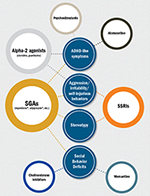|
Today's Headlines
Migraine prevention drugs used during pregnancy can cause decreased IQ scores in children born to mothers who take these medications, according to an FDA alert. » Full article
|
|
FDA has approved ezetimibe and atorvastatin (Liptruzet, Merck) tablets for the treatment of elevated low-density lipoprotein cholesterol in patients with primary or mixed hyperlipidemia as adjunctive therapy to diet, according to the manufacturer.
» Full article
|
|
A group of doctors and researchers is protesting the high cost of certain cancer drugs and is urging pharmaceutical companies to make changes. » Full article
|
|
Zoster vaccination was associated with a reduction in post-herpetic neuralgia among those who are aged 65 and older, according to a study, published in PLoS Medicine. However, they also found that the use of the shingles vaccine was also very low among certain population groups. » Full article
|
Continuing Education
Welcome to our CPE series: Pain Management Considerations for Medication Therapy Management, which has been designed for pharmacists who take care of patients who need pain relief. You can earn up to 10 credits from April 2013 to August 2013 with 5 monthly knowledge-based activities and 2 credits from September 2013 to October 2013 with 2 monthly interactive online case studies.
The May activity covers pharmacology and therapeutics of pain medications, focusing on non-opioid analgesics.
To read and print the article with TEST QUESTIONS, click here. To proceed to the online exams and earn up to 2 CPE credits, click here to log in.
Announcement: Welcome to the new user registration process. This new process requires all pharmacists and pharmacy technicians to provide
or update their NABP e-Profile ID in order to electronically keep track of CPE credits from ACPE-accredited providers. If you have not done so, you can obtain your NABP e-Profile ID now at
www.MyCPEmonitor.net. This profile will enable you to have one login
for all the NABP programs and services you will need throughout your career.
|
|
EDITOR'S PICK

|
Autism spectrum disorders (ASD) are complex neurodevelopmental disorders that involve significant social functional impairment and behavioral inflexibility. Autism is the most severe form of ASD and includes significant impairment in communication skills. Treatment of ASD is complex and involves a comprehensive educational interventional plan. Medications are used only as adjuncts, and only in cases in which maladaptive behaviors are severe or life-threatening, or to enable a patient to participate in their behavioral therapies. The most commonly used medications include second-generation antipsychotics (SGAs), selective serotonin reuptake inhibitors (SSRIs), and psychostimulants. Risperidone and aripiprazole are the only medications to carry an FDA indication to treat ASD-related symptoms. There is interest in using newer agents, such as atomoxetine, galantamine, rivastigmine, and memantine, to treat ASD-associated symptoms, but data are lacking to support their use. » Full article
|
|
|
SURVEY
— Continue to remain the gold standard for
treatment-naïve patients
— Shared first-line role with newer
non-interferon regimens
— Reserved primarily for 2nd-line use in
patients failing interferon-free regimen
— Very minimal role moving forward
Click Here to let us know.
|
|
